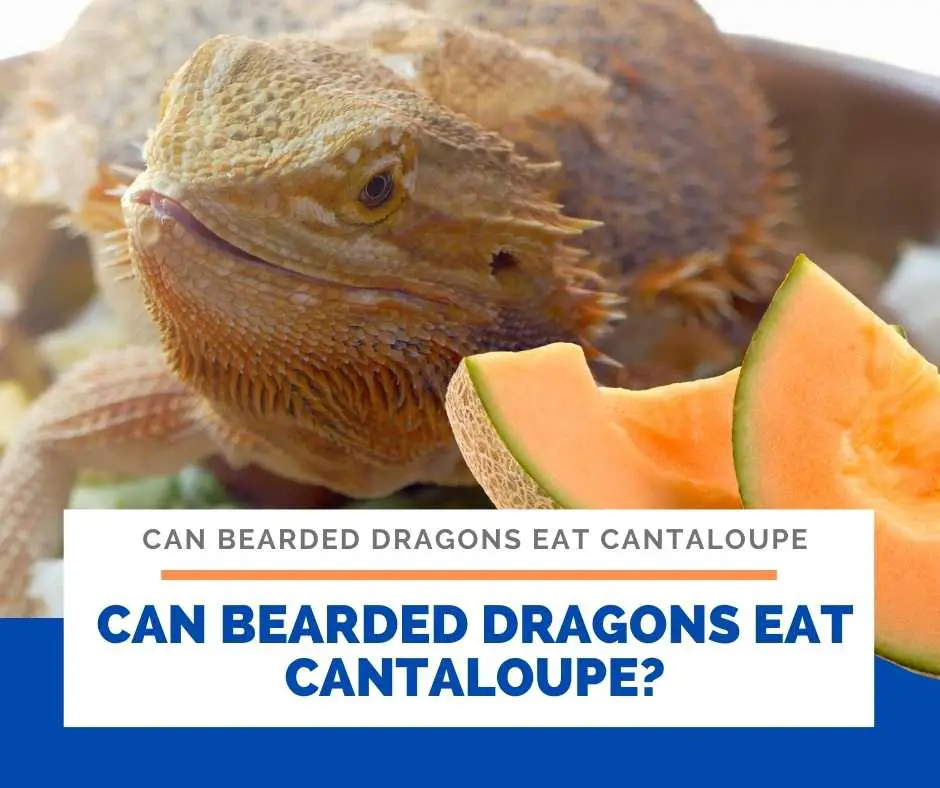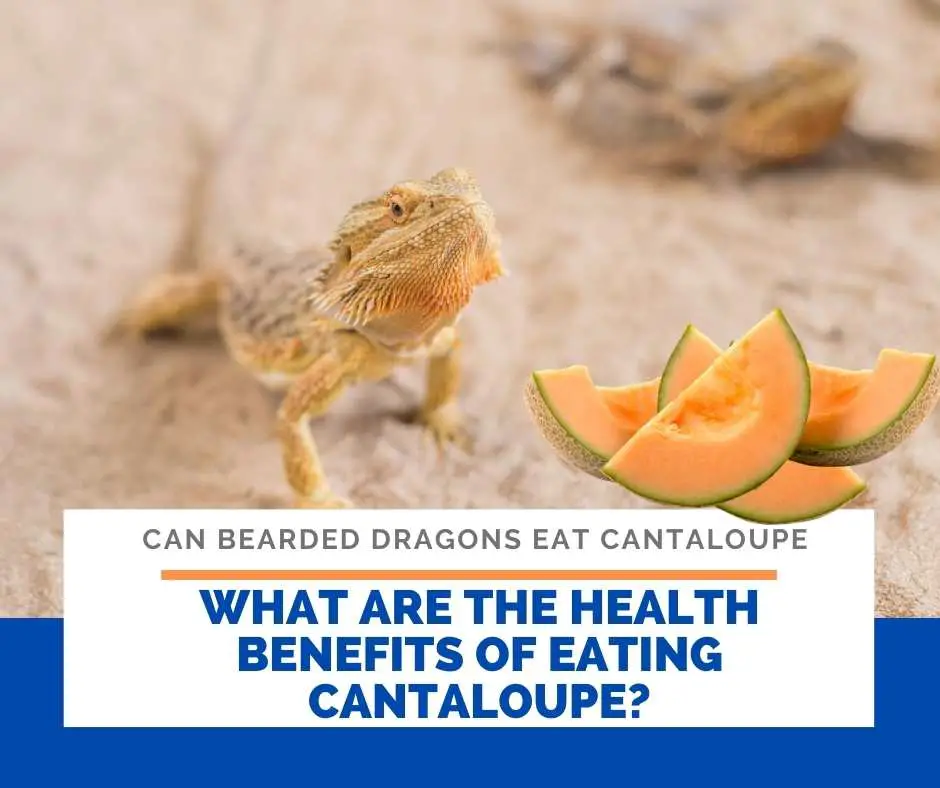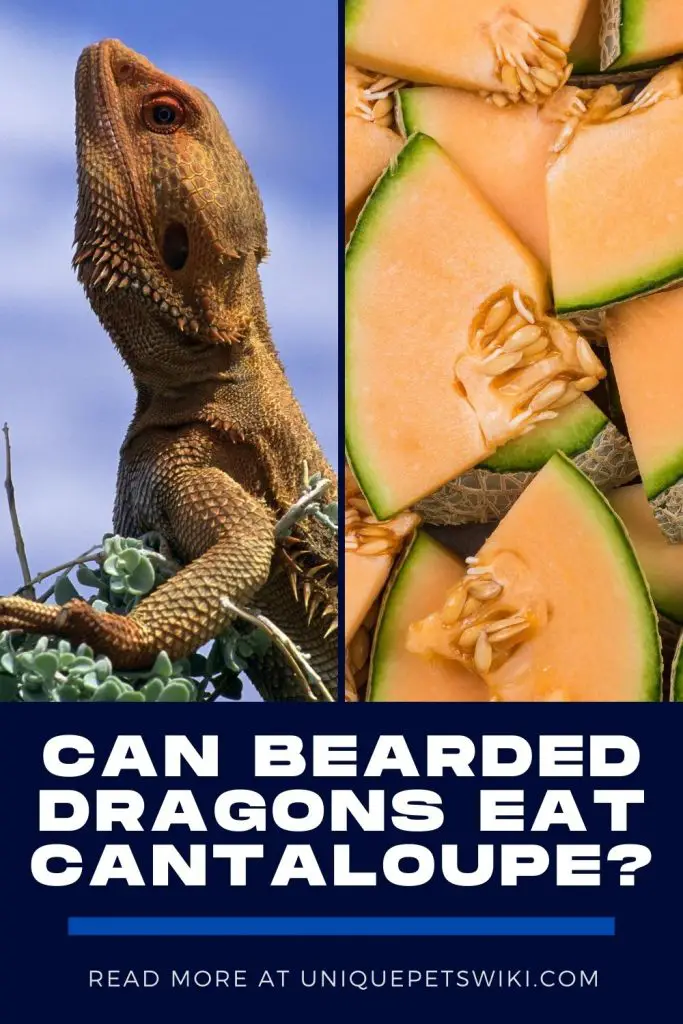If you have been wondering whether bearded dragons can eat cantaloupe, you will appreciate knowing how good and nutritious these fruits are.
Cantaloupes provide multiple health benefits to humans and are also a perfect choice fruit for bearded dragons. Many people are curious to know if it is safe to feed cantaloupe to their beardies and what its impact is healthwise.
Cantaloupe nutritional composition, including water, dietary fiber, protein, vitamin, minerals, sugar, and fats, is of great interest to the beardies.
Here, you will learn everything you need to know about cantaloupe fruits and more other useful information.
This article has been reviewed by Dr. Dilber. Read more about our knowledge control process here.
Contents
Why is Cantaloupe a Good Fruit?

It has been a common habit with people where the majority of them prefer to have berries and grapes and will not look at melons, or they are the last option. Little did they know that cantaloupes or simply melon are extremely loaded with nutrients.
Cantaloupe deserves all the respects that you would give to other fruits. It may be an odd-looking fruit, but it is a perfect choice melon to supply dense nutrients to you and your pet. This melon makes a refreshing dessert during summer and helps to keep the body hydrated.
Aside from the high-water content in cantaloupe, it is an excellent source of vitamins, minerals, and dietary fiber. Also, cantaloupe has a wide range of antioxidants as well as anti-inflammatory phytonutrients. Phytonutrients help to fight against diseases.
And by this, I mean that it contains beta-carotene, carotenoids alpha-carotene, caffeic and ferulic organic acids, lutein, cucurbitacin A and E, among others.
All the above nutrient contents reveal the beneficial part of cantaloupe, aside from being tasty. Cantaloupe is among the top fruits rich in vitamin A and is also the topmost among melons. Below are nutritional facts about cantaloupe, according to USDA.
The list shows the amounts of specific nutrients per 177 grams provided by cantaloupe. It also shows the percentage of the daily value calculated based on a 2000 calorie diet.
- Calories: 60
- Fat: 0.3g (0%)
- Sodium: 28.3mg (1%)
- Potassium: 472.6mg (13%)
- Phosphorus: 26.6mg
- Total Carbs: 14.0g (4%)
- Sugar: 14.0g
- Dietary fiber: 1.6g
- Protein: 1.5g (3%)
- Vitamin A: 119%
- Vitamin C: 108%
- Vitamin B-6: 5%
- Iron: 2%
- Magnesium: 5%
- Calcium: 1%
Can Bearded Dragons Eat Cantaloupe?

Yes, cantaloupe is a safe fruit to feed bearded dragons, but it should only be given as an occasional food. As I mentioned earlier, cantaloupe is rich in vitamin A, vitamin C, and water. However, it is sweet, meaning it has high sugar concentration.
Also, cantaloupe has little amounts of calcium, but the level of potassium is slightly high, as you can see from the nutritional list above. Excess of potassium in the bearded dragon’s diet will interfere with calcium uptake, resulting in metabolic bone disease.
So, due to the high sugar content and increased amounts of potassium, you should limit the number of cantaloupes you give to your bearded dragon. Too much sugar is dangerous for the beardies because it can cause tooth decay.
Likewise, excess water can cause the beardies to diarrhea. Moreover, the high amounts of phosphorus in cantaloupe suppresses calcium ions in bearded dragons, and this might lead to hypocalcemia (calcium deficiency).
Another thing to note is that cantaloupes have a high acid level, ranging between 4.5-6.9. Therefore, if you feed them excessively, they encourage acid accumulation and cause digestive disturbances.
And all these prove why cantaloupe should not be a regular food to bearded dragons. Instead, it will be more beneficial to use it as a treat to help the beardie enjoy the multiple nutrients.
What are the Health Benefits of Eating Cantaloupe?

Cantaloupe is loaded with nutrients, and so, it has many benefits toward health, that is if it is consumed correctly.
Below are the reasons why you should consider giving cantaloupe to your bearded dragon; it is one of the best foods to keep your pet healthy.
Enhances Digestion
Cantaloupe provides plenty of water and has some fiber, and the two help in the digestion process. Dietary fiber allows food to stay in the digestive tract for a fairly good time to allow more time for absorption.
Fiber, together with water, promotes a healthy digestive system and prevents issues of constipation. Fiber also helps to decrease the levels of bad cholesterol in the bearded dragon’s body.
Prevents Dehydration
Cantaloupe is a high-water fruit and can be the perfect choice to keep your dragon hydrated. It contains about 90% water and therefore serves as an excellent choice snack when the weather is hot.
There are several ways to check whether your bearded dragon is dehydrated. You can use the pinch skin method, and if the beardie is dehydrated, the skin takes time to obtain the normal shape.
Also, the bowel movement appears dry, and the urate is yellow, or there is no urate excreted. Moreover, a hydrated dragon tends to take a lot of water and drinks quickly when you provide water.
Reduces Blood Pressure
Here is another great impact cantaloupe has on health, lowering the blood pressure. It is made possible since cantaloupe has high potassium levels and reduced sodium.
Increased potassium and low sodium in foods help to keep blood pressure down, and cantaloupe qualifies in that function.
Cantaloupes Support Eye Health
Similarly, to carrots, cantaloupes have carotenoids that are responsible for its orange color. Cantaloupe is among the best foods that contain the highest amounts of beta-carotene.
This fruit has more beta-carotene compared to mangos, oranges, apricots, peaches, grapefruits, among others. After consumption, beta-carotene is converted to vitamin A in the body.
Vitamin A supports eye health, and it is also important for healthy red blood cells and the immune system.
Controls Diabetes
Cantaloupe has been proved to control diabetes in the beardies because it comprises phytonutrients that can improve the metabolism of blood sugar and insulin. Bearded dragons digest cantaloupe slowly and it does not increase their blood sugar levels. So, it is great for dragons suffering from diabetes.
Also, taking cantaloupe helps to boost insulin resistance and lower the oxidative stress from the kidney in the animals that have diabetes.
Another good thing to know about cantaloupe is that its high amounts of vitamin C improves the healing process, boosts the immune system, protects the body against damage from free radicals, and helps in iron absorption.
There are other health benefits from cantaloupe, which include reducing the risks of cancer and heart health, aids in healing the sunburns, among others.
How Often Can I Feed Cantaloupe to My Bearded Dragon?
As we have seen, cantaloupe is best when used as a treat because of the several risks associated with it when fed frequently. So, it is important to know how often you need to provide these fruits to your bearded dragons.
It is recommended to give small quantities of cantaloupe, which may include a small piece or two pieces within a week. Make sure to peel and slice cantaloupe fruit into small sections to prevent choking and allow the beardie to swallow easily.
Note: Always remember never to give cantaloupe as a staple food to bearded dragons.
I’m sure now you know why it is not recommended to feed bearded dragons with cantaloupe more often. And I believe you don’t want to expose your pet to any dangers, so ensure you do what is best for your pet.
The good foods for the beardies should have higher calcium content than phosphorus to prevent metabolic bone disease from occurring.
Can I Feed My Bearded Dragon with Cantaloupe Stem and Leaves?
If you are wondering if you can feed your bearded dragon with cantaloupe stem, leaves or flowers, I advise you not to do it. The leaves and stem of cantaloupe have so many cons that make them unnecessary food for bearded dragons, but other animals eat them.
First, the succulent leaves and stems have a lot of water, which adds to the diet and can result in diarrhea or watery poo.
Secondly, there are hair linings on the leaves and stems, which irritates the mouth and GIT during swallowing, and this creates a persistent discomfort after feeding.
Thirdly, cantaloupe leaves and stems have alkaloids and, if consumed in high quantities, might cause complications with digestion and enzymatic reactions, and hormonal imbalance.
Also, stems and leaves from wild cantaloupe tend to be poisonous and can kill your bearded dragon. Succulent leaves and stems are high in pH; thus, it can lead to throat irritation and indigestion issues when swallowed.
Vet comment: Cantaloupe leaves contain harmful and toxic compounds which not only upset the digestive system but also disturb the absorption of the nutrients into the epithelium. They also disturb the release of enzymes into the intestine.
Fireflies, insects, and worms like dwelling in cantaloupe leaves and stems, and since fireflies are toxic, they can kill your bearded dragon when eaten. A single firefly can kill a bearded dragon in minutes only.
Another downside about leaves and stems from cantaloupe is that they are rough, and they tend to stick on the tongue and palate when the beardie tries to swallow them.
Moreover, the cantaloupe’s flowers have toxic substances, and the poisonous insects to bearded dragons like lighting bugs inhabit them.As you can see, cantaloupe stems and leaves are dangerous and should be avoided completely.
How to Prepare Cantaloupes When Feeding Bearded Dragons
You will need to prepare cantaloupe in the right way to enhance the proper health standard of your pet, and always use it as an occasional food. Below are simple steps to follow when preparing cantaloupe for feeding bearded dragons.
- When harvesting, remove the foliage and vines and allow the fruit to stay for about a week to reduce its fresh-water content.
- Use warm water where possible to clean the fruit to get rid of insects and any bacteria on the skin.
- The next thing is to peel the fruit’s skin carefully. The outer green surface has a high acid level and contains much phosphorus content, and this will cause an imbalance in calcium and phosphorus in the beardie.
- Slice the fruit into small sections; they should not be bigger than the size of your beardie’s eye to facilitate easy swallowing.
- Allow the slices to spend some time in a warm environment before feeding. This helps to drip the excess water content.
- Now the cantaloupe is ready for feeding; make sure to provide your beardie with 1-2 pieces of cantaloupe to prevent the problem associated with it from developing. You can feed it as part of the diet.
Conclusion

Cantaloupe is indeed a beneficial fruit and deserves all the respects, just like other fruits like grapes, oranges, etc. It is pretty rich in vitamin A and vitamin C is cholesterol-free and has low saturated fat.
You should only use Cantaloupe infrequently to feed the beardies, probably two small pieces in a week. If it is fed regularly, it can result in problems like calcium to phosphorus imbalance, metabolic bone disease due to calcium deficiency, and many other risks, as we have seen above.
